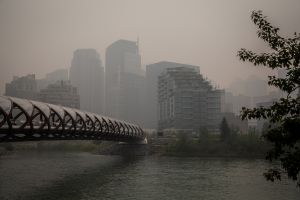 Wildfire season typically runs from early April to late October in Canada. As a result, communities across Canada are more likely to experience poor air quality due to wildfire smoke.
Wildfire season typically runs from early April to late October in Canada. As a result, communities across Canada are more likely to experience poor air quality due to wildfire smoke.Exposure to wildfire smoke can lead to serious health emergencies, and it’s important to know the signs, symptoms, and how to respond.
Some people are at higher risk of health problems due to wildfire smoke exposure. This includes:
- Seniors
- Pregnant people
- People who smoke
- Infants and young children
- People who work outdoors
- People involved in strenuous outdoor exercise
- People with an existing illness or chronic health conditions, such as:
- Cancer
- Diabetes
- Lung or heart conditions
Symptoms resulting from wildfire smoke exposure can include:
- Headaches
- A mild cough
- Production of phlegm
- Sore and watery eyes
- Nose, throat and sinus irritation
More serious but less common symptoms of wildfire smoke exposure can include:
- Dizziness
- Chest pains
- Severe cough
- Shortness of breath
- Stridor (noise on inspiration caused by laryngeal irritation)
- Wheezing (including asthma attacks)
- Heart palpitations (irregular heartbeat)
Less commonly, exposure to wildfire smoke can lead to:
- Stroke
- Heart attack
- Premature death
How to protect yourself from wildfire smoke and poor air quality
- Limit outdoor activity as much as possible
- Use a portable air purifier to filter the air in your home
- Keep your windows closed
- Ensure your furnace filter is clean and changed monthly during wildfire season
- Stay hydrated
- If you have a chronic health condition, work with your healthcare provider to create a management plan for wildfire smoke conditions
- Stay informed on local and regional air quality conditions
Visit the Government of Canada’s Interactive Map through the Canadian Wildland Fire Information System to stay up to date on local wildfire alerts.
Related stories:
Heatwave warning: What you need to know about heat-related emergencies

